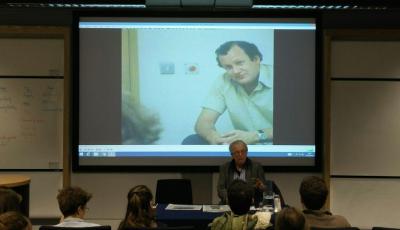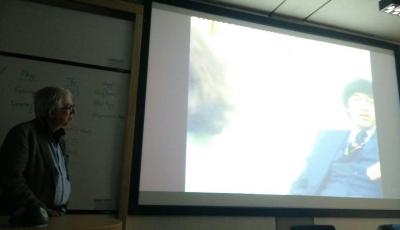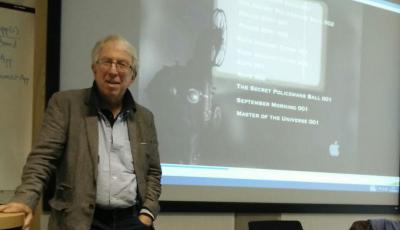Post by Yuria Saavedra-Alvarez, MSc student in Criminology and Criminal Justice, University of Oxford. This is the fourth post in a series reflecting on six special seminars organised and hosted by the 2015-16 MSc in Criminology and Criminal Justice students.

Taking an interactive approach, Mr Graef started his seminar with a game, asking the students where we usually got news from and what we look for in trusted news sources. With the support of one of our classmates, he drew a list of different national and international media on the internet, radio, TV, apps, and in print. Subsequently, he questioned how many of us relied on what we read. Mr Graef wanted to demonstrate that most of us―and people in general―usually read no more than one newspaper nor look up more than one news source, and that this might be the only source we trust. Although this tendency isn’t regretful in itself and may even be good because it reflects confidence in that source, it impacts the kind of information received. The world looks different depending on what newspapers are read, what websites are visited, and so forth. The same story could be told differently in different sources.
Mr Graef mentioned one reason why people feel attracted to a particular news source: the fear that may be produced by a story. Fear, he explained, produces adrenaline, which is like a ‘high.’ Mr Graef said that ‘the whole theory of crime problem as a journalistic one,’ a drug problem, and the drug is adrenaline. Therefore, people tend to get excited by reading some stories, which is why newspapers want to cover them to please their readers.

Mr Graef further pointed out that many stories and news items are vitiated with ‘factoids,’ that is, false statements presented as true facts. Nevertheless, if a different piece of information is presented as a counter-factor, it produces a cognitive dissonance, a tension between conflicting facts. This is a problem of communication. For example, the British Crime Survey, the ‘holy grail’ for police figures, only measures police activity and crimes that have been reported to the police and that the police have recorded. Consequently, these data don’t include all aspects of crime and victimization. Notwithstanding, politicians and others want to trust those official figures and state that crimes are decreasing.
On the other hand, Mr Graef made a reference to the vicious circle of disinformation produced when only one piece of information is looked up and is subsequently repeated or reprinted news released in another outlet and so on. In addition, quoting Le Monde, he suggested that there’s an aristocracy of information under which key information is in the hands of certain groups or elites. All of this generates a single version and prevents dialoguing and questioning of different, often competing, positions.
In the last part of the seminar, Mr Graef exhibited an extract of the episode ‘A Complaint of Rape’ of the BBC television series Police (1982) about a woman that claims she has been raped by three strangers but, in turn, is examined by three male officers in Reading who bully her and seem to dismiss her story in many hostile ways. After listening our views and thoughts about the clip, Mr Graef mentioned that this episode caused a public outcry in the UK and led to a change in the way police forces handled rape cases (i.e., a new rape squad composed of only female officers was formed in Reading).

In closing, Mr Graef stressed that informed skepticism is needed to follow the news, reading more than one source, and comparing different sources, because each will display diverging sets of prejudices and priorities. He encouraged us to be aware that the world is changing and to be curious, look around, and ask questions although this may mean ‘surfing ludicrous amounts of information.’
Mr Graef’s presentation was tremendously inspiring and he shared with us a strong commitment to looking for ‘the truth’ and generating change through our work.
Share:
